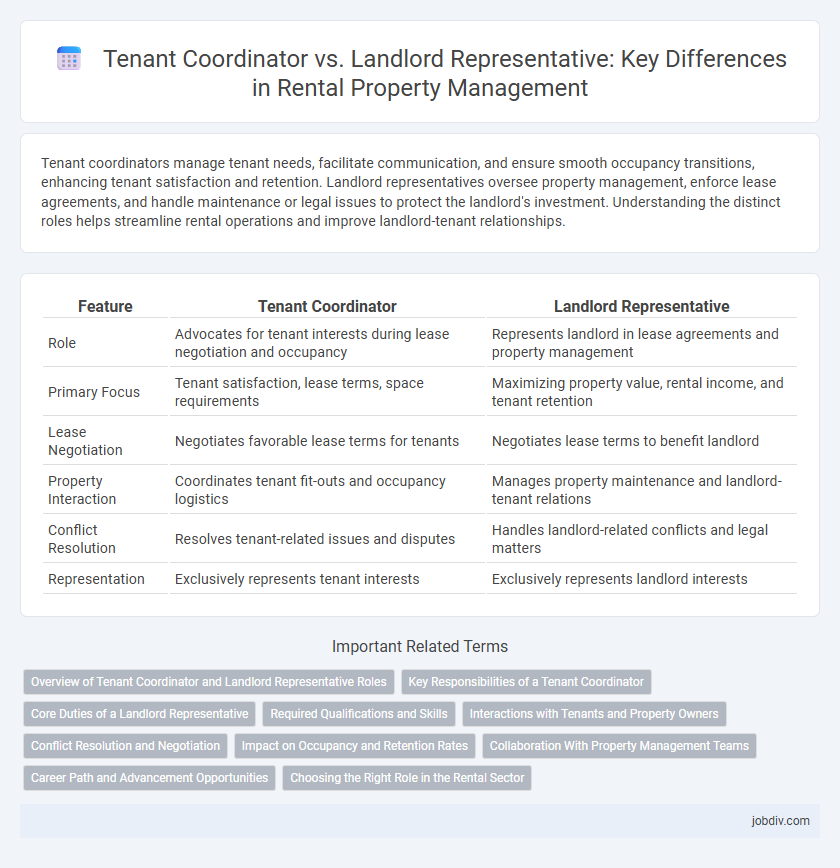Tenant coordinators manage tenant needs, facilitate communication, and ensure smooth occupancy transitions, enhancing tenant satisfaction and retention. Landlord representatives oversee property management, enforce lease agreements, and handle maintenance or legal issues to protect the landlord's investment. Understanding the distinct roles helps streamline rental operations and improve landlord-tenant relationships.
Table of Comparison
| Feature | Tenant Coordinator | Landlord Representative |
|---|---|---|
| Role | Advocates for tenant interests during lease negotiation and occupancy | Represents landlord in lease agreements and property management |
| Primary Focus | Tenant satisfaction, lease terms, space requirements | Maximizing property value, rental income, and tenant retention |
| Lease Negotiation | Negotiates favorable lease terms for tenants | Negotiates lease terms to benefit landlord |
| Property Interaction | Coordinates tenant fit-outs and occupancy logistics | Manages property maintenance and landlord-tenant relations |
| Conflict Resolution | Resolves tenant-related issues and disputes | Handles landlord-related conflicts and legal matters |
| Representation | Exclusively represents tenant interests | Exclusively represents landlord interests |
Overview of Tenant Coordinator and Landlord Representative Roles
Tenant Coordinators oversee tenant relations, managing lease agreements, addressing tenant concerns, and coordinating move-ins and move-outs to ensure tenant satisfaction. Landlord Representatives handle property management duties, including rent collection, lease enforcement, and maintenance coordination to protect the landlord's investment. Both roles are essential for efficient rental operations but focus on different aspects of property and tenant management.
Key Responsibilities of a Tenant Coordinator
A Tenant Coordinator manages tenant relations by facilitating communication between tenants and property management, coordinating move-ins and move-outs, and addressing maintenance requests efficiently. They ensure compliance with lease agreements and assist in resolving tenant disputes to maintain occupancy satisfaction. Their role is essential for smooth tenant onboarding and ongoing support throughout the rental term.
Core Duties of a Landlord Representative
A Landlord Representative manages lease negotiations, property maintenance coordination, and tenant relations to maximize property value and ensure compliance with regulations. They handle rent collection, enforce lease terms, and address tenant concerns to protect the landlord's interests. This role requires expertise in market analysis, contract management, and dispute resolution to optimize rental income and maintain positive tenant experiences.
Required Qualifications and Skills
Tenant Coordinators require strong communication skills, conflict resolution abilities, and knowledge of lease agreements to effectively manage tenant concerns and coordinate move-ins. Landlord Representatives must possess expertise in property management, legal compliance, and negotiation skills to advocate for the landlord's interests and oversee lease enforcement. Both roles benefit from proficiency in facility operations, contract management, and a thorough understanding of local rental laws.
Interactions with Tenants and Property Owners
Tenant Coordinators facilitate communication by addressing tenant inquiries, resolving maintenance issues, and ensuring tenant satisfaction throughout the lease term. Landlord Representatives manage property owner interests by negotiating lease agreements, coordinating property maintenance, and maximizing rental income. Both roles require effective interaction skills but focus respectively on tenant relations and property owner priorities.
Conflict Resolution and Negotiation
Tenant Coordinators specialize in advocating for tenants' interests, facilitating communication, and resolving disputes collaboratively to maintain positive tenant-landlord relationships. Landlord Representatives prioritize protecting property owners' rights by negotiating lease terms and addressing tenant conflicts to minimize risks and maximize profitability. Effective conflict resolution and negotiation in rental agreements depend on balancing both roles to ensure fair outcomes and sustained occupancy.
Impact on Occupancy and Retention Rates
Tenant Coordinators directly engage with tenants to address their needs and resolve issues efficiently, leading to higher occupancy and improved retention rates. Landlord Representatives primarily focus on property management and lease negotiations, which can stabilize occupancy but may not influence tenant satisfaction as deeply. Properties with dedicated Tenant Coordinators experience enhanced tenant loyalty and reduced turnover, contributing to sustained revenue growth.
Collaboration With Property Management Teams
Tenant coordinators and landlord representatives play distinct roles in rental property management, with tenant coordinators focusing on facilitating communication and addressing tenant needs while landlord representatives handle lease negotiations and property owner interests. Effective collaboration with property management teams ensures streamlined operations, timely maintenance responses, and enhanced tenant satisfaction. This coordinated effort improves occupancy rates and fosters long-term relationships between tenants and landlords.
Career Path and Advancement Opportunities
Tenant Coordinators typically advance through roles in property management or leasing, gaining expertise in tenant relations and lease administration. Landlord Representatives often pursue careers in commercial real estate brokerage or asset management, leveraging skills in negotiations and property portfolio strategies. Both paths offer growth, with Tenant Coordinators focusing on operational roles and Landlord Representatives expanding into strategic leadership positions.
Choosing the Right Role in the Rental Sector
Tenant coordinators specialize in managing tenant relations, lease agreements, and maintenance requests, ensuring tenant satisfaction and smooth communication within residential or commercial properties. Landlord representatives focus on property management from the owner's perspective, handling rent collection, legal compliance, and maximizing property value. Selecting the right role depends on whether the priority is tenant-centric services or property owner objectives in the rental sector.
Tenant Coordinator vs Landlord Representative Infographic

 jobdiv.com
jobdiv.com